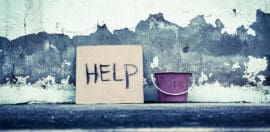Childhood poverty trapping kids in cycles of disadvantage

28 October 2020 at 3:38 pm
The University of Melbourne has partnered with the Paul Ramsay Foundation to research the causes of entrenched poverty
Children who experience poverty are more than three times as likely to be poor when they are adults, according to new research exploring socioeconomic disadvantage in Australia.
The Melbourne University report uses data from the Household, Income and Labour Dynamics in Australia (HILDA) survey, following around 1,300 children aged nine to 15 in 2001 from childhood into adulthood in 2018.
Researchers found that adults who experienced childhood poverty were 3.3 times more likely be poor, 2.5 times more likely to live in social housing, and 2.5 times more likely to experience financial stress than young adults who never experienced poverty.
Conversely, young adults who grew up poverty-free were found to have 23 per cent higher hourly wages, and were 2.4 times more likely to get university degrees, 1.8 times more likely to work full-time, and 1.3 times more likely to hold permanent jobs.
The report is part of a new multi-year project exploring solutions to cycles of poverty from the University of Melbourne in partnership with the Paul Ramsay Foundation.
It will entail a series of studies to better understand the extent, nature and causes of socioeconomic disadvantage in Australia.
Paul Ramsay Foundation CEO Professor Glyn Davis AC said addressing poverty was a crucial challenge for the nation.
“Poverty and inequality are at the core of poor intergenerational mobility. They shape access to opportunities in education, employment and society more generally,” Davis said.
“This report presents empirical evidence that growing up poor reduces a child’s economic prospects in Australia. Alleviating poverty for children now will help break cycles of disadvantage for the future.”
Poverty was defined as households that earn less than half the national median income – around $24,000 in 2018.
The report found even small periods of childhood poverty had an adverse effect on young people entering adulthood.
Report co-author Professor Roger Wilkins said that the findings show more needs to be done to tackle childhood poverty.
“Reducing childhood poverty would have many substantial benefits – not just for children later in life, but also benefits to the wider community,” Wilkins said.
“Greater participation in the labour market would increase tax revenue, reduce the need for welfare, and perhaps even reduce demands on the criminal justice system.”
Wilkins told Pro Bono News that without action on the issue, it was likely existing inequalities would persist.
He also noted that the report did not fully flesh out all the ways in which poverty could reduce children’s long-term outcomes.
“Is it reducing their educational opportunities, is instability in home life undermining children’s development?” he said.
“There’s some other work in this space that’s looking at how poverty impacts on child development. But that hasn’t been followed through to [explore] what it actually means for children’s outcomes in adulthood.”
Wilkins said researchers needed to go further in exploring the mechanisms driving the intergenerational transmission of poverty.
He said this could make the right policy responses to address poverty clearer.
“Obviously one policy response is to boost government income support to low-income families. But what priority should be given to putting more money into education of children in poor families or other social or housing supports?” he said.
“That is where we need to delve further into from a research point of view.”
The report – which is the first of three to be released in 2020 through this partnership – can be seen here.







